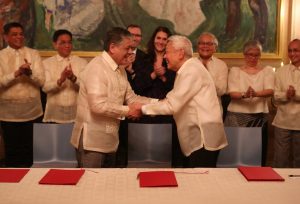The Philippine government and the country’s communist insurgents have agreed to restart peace negotiations after a six-year hiatus, with the goal of finally bringing their decades-long conflict to an end.
High-ranking delegations from Manila and the communist National Democratic Front of the Philippines (NDFP) last week agreed to a “common vision for peace,” Norway’s Foreign Ministry announced yesterday in Oslo. Norway has helped mediate the conflict for more than two decades.
In a joint statement, the two sides said that they “agree to a principled and peaceful resolution of the armed conflict” and will seek to resolve the “deep rooted socioeconomic and political grievances” that have sustained the NDFP and the Communist Party of the Philippines (CPP) for more than half a century. It added that both sides “look forward to a country where people can live in peace and prosperity.”
The pledge was sealed at Oslo City Hall with a handshake between Antonio Lagdameo Jr., special assistant to Philippine President Ferdinand Marcos Jr., and Luis Jalandoni, a member of the NDFP’s National Executive Council.
According to The Associated Press, the text was the result of several informal discussions between the sides held in the Netherlands and Norway since the beginning of 2022.
Communist uprisings have roiled the Philippines since before its independence, feeding on the nation’s massively skewed patterns of wealth distribution. The current insurgency, which is spearheaded by the New People’s Army (NPA), the armed wing of the CPP, dates back to 1969. If negotiations succeed, they will pave the way for the “transformation” of the CPP-NDF-NDF into a political movement.
Successive administrations have attempted to eradicate the NPA, which at the height of its power in the 1980s had a force of 25,000 armed guerrillas scattered throughout the Philippine archipelago. Military officials estimate that the group currently has about 2,000 active insurgents. More than 40,000 people have been killed during its more than half-century-long conflict with the Philippine state.
Formal peace talks have not taken place since late 2017, when they were terminated by then-President Rodrigo Duterte after a reported NPA attack on the southern island of Mindanao. Duterte then added the CPP-NDF-NPA to the country’s register of terror groups and resumed attempts to destroy the insurgency by force. On coming to office in 2016, Duterte had promised to end the conflict and seemed well placed to do so, given his personal connections to left-wing political figures including Jose Maria Sison, who died in December of last year in exile in the Netherlands at the age of 83.
After yesterday’s announcement, Norway’s top diplomat congratulated the two warring parties “on their decision to start formal peace negotiations.”
“This is an important and timely step towards securing lasting peace in the Philippines,” Foreign Minister Espen Barth Eide said in a statement. “Extensive work remains and we look forward to continuing to support the Parties in the process towards a final peace agreement.”
Last week’s talks also pledged to remove the CPP-NDF-NPA and their affiliates from a government list of designated terrorist groups, which might spell an end to the pernicious practice of “red-tagging” – the branding of government critics as communist sympathizers. However, as Reuters reported, a ceasefire has yet to be announced, and Philippine military chief Gen. Romeo Brawner said that operations against the group would continue until further notice.
However, Brawner also said an eventual peace deal would allow the Armed Forces of the Philippines finally to pivot from grinding land battles against domestic insurgents to a focus on external defense – a reference to the ongoing Chinese incursions into the Philippines’ sections of the South China Sea.
“If this conflict will finally end, your Armed Forces of the Philippines will be able to shift our focus to external or territorial defense,” Reuters quoted him as saying. “Our resources, efforts will be poured into defending our territory.”
The joint statement signed between the Philippine government and the CPP-NDF-NPA also made reference to “the foreign threats facing the country,” and that both sides recognized “the need to unite as a nation” in order to resolve these and other challenges.

































